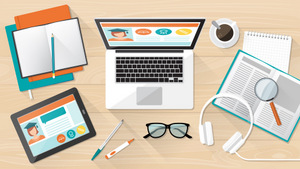"Tell me and I forget, teach me and I may remember, involve me and I learn." ― Xunzi (Chinese Confucian philosopher, though often falsely attributed to Benjamin Franklin)
 Learning how to learn is key to mastery, but it turns out that tried and true methods of learning aren't necessarily so true after all. John Dunlosky et al[1] found that summarization, rereading, and keyword association, though widely practiced, are among the least effective learning techniques. The best learning techniques are practice tests and distributed practice.
Learning how to learn is key to mastery, but it turns out that tried and true methods of learning aren't necessarily so true after all. John Dunlosky et al[1] found that summarization, rereading, and keyword association, though widely practiced, are among the least effective learning techniques. The best learning techniques are practice tests and distributed practice.
Best ways to learn
If you're learning Spanish, you're in luck, because practice tests are what Kwiziq Spanish is all about. Our kwiz-based system will create your personalized Study Plan and challenge you on every aspect of grammar until you are confident enough to move on to new material.
Distributed practice, also known as spaced learning, essentially refers to spreading out your studying to correspond with how long you want to remember it. Research[2] shows that 10-30% is the most efficient value of inter-session interval (the amount of time between study sessions) to retention interval (how long you remember the material). In other words, if you want to remember for a month, you should to study the material once or twice a week. To remember for a year, brush up your knowledge every 6 weeks to 4 months.
This is the opposite of cramming for a test, also known as "overlearning." Sure, this will stuff your brain with enough information to pass or even ace your test, but it's not learning so much as temporarily memorizing: "[W]hile overlearning often increases performance for a short while, the benefit diminishes sharply over time."[2]
How do you learn best?
The idea of individual "learning styles" is controversial, but in my experience it is very real. My husband and I both love language, but our respective abilities to learn a new one depend almost entirely on how it's presented to us. People talking? My husband listens and tries out new words immediately, while I hurriedly write them down. Quite simply, I can't truly "hear" them until I see them. In contrast, I can memorize complicated grammar rules from a book and incorporate them into my speech, but he struggles with regular verb conjugations even after speaking a language for decades.
How well you learn depends on a few different factors, including your own learning style. Take a look at this article that can help you understand how you learn best.
The bottom line
Time you invest in learning about learning will pay off many times over in your actual learning. There are general techniques and tips that work for everyone, and then there are your own personal learning tricks. Take some time to figure out what works best for you and how to improve on what you're doing.
Pro tip: Simon, Kwiziq's CTO, highly recommends Coursera's Learning How to Learn, which offers "powerful mental tools to help you master tough subjects." It's free if you opt out of the certificate.
References
1 Dunlosky, John et al (2013). "Improving Students' Learning With Effective Learning Techniques." Psychological Science in the Public Interest, January 2013 vol. 14 no. 1, 4-58
2 Rohrer, Doug and Pashler, Harold (2007). "Increasing Retention Without Increasing Study Time." Current Directions in Psychological Science, August 2007 vol. 16 no. 4, 183-186
